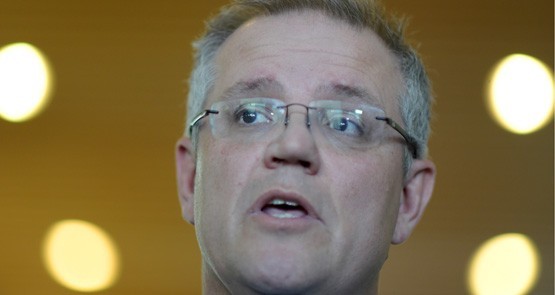
A taxpayer could get dizzy trying to follow the perturbations of the government’s revenue and its fate in recent weeks.
A few weeks ago a blip in the jobs data and trouble on global sharemarkets had commentators speculating the government was in dire economic straits and putting pressure on Scott Morrison to Do Something.
What a difference a month, and a silly spike in commodity prices, makes. The turnaround in commodity prices suddenly had the government “eyeing a windfall gain from soaring iron ore prices” according to Fairfax’s Mark Kenny.
Windfall? Did someone say windfall? We know what Coalition governments do with windfalls: they spend them quick smart, like John Howard and Peter Costello did with the first mining boom. Except today the AFR‘s Phil Coorey reported that any windfall would go toward reducing the deficit.
In the interim, iron ore had fallen back below $60 a tonne. But the Aussie dollar, unhelpfully, has surged, which will undermine any revenue benefits from a higher price anyway. And even if iron ore surges again, however, remember the slide in commodity prices, especially in oil and gas and iron ore, has caused huge losses for companies of all sizes — and those losses (for the likes of Arrium, BHP Billiton, Rio Tinto, BC Iron, Atlas Iron, Woodside, Santos, Beach Energy and many more) will be used to offset any profits coming from the rise in the price of the commodities concerned.
That was the original reason tax revenues didn’t recover after the financial crisis, despite a return to profit of many businesses — they were taking advantage of losses incurred during the downturn to reduce their tax liability.
And let’s just parse the government’s thinking for a moment.
On “tax reform” (let’s use the term, however inapt it might be for whatever Malcolm Turnbull might serve up either before the budget or on Budget night, whenever that might be) the government’s goal is to curb tax expenditures and revenue losses elsewhere — most likely on superannuation and work deductions — to fund some sandwich-and-milkshake tax cuts.
That is, increased revenue from actual government policy changes won’t go to address Australia’s substantial budget deficit, but to bribe voters. But if the government manages to fluke some extra money, that will be used to lower the deficit.
Banking windfall revenue gains is a good idea. Last time we had them, they became the basis of a long-term revenue problem, because Howard and Costello gave us permanent tax cuts based on them, sending the budget into structural deficit. Better to stick that money in the Future Fund — or pay off debt.
But why aren’t we doing that with additional revenue from “reform”? Ostensibly, that’s because the government wants to address bracket creep — even though that’s currently a non-problem, as even Finance Minister Mathias Cormann admits. And if the government really thinks workforce participation and investment will be boosted by a few bucks a week in tax cuts, its modelling must have some pretty elastic assumptions built into it.
In reality, tax cuts would be a rather sad attempt to buy votes, John Howard-style — except Howard was doing it when the budget was in surplus and we’d paid off net debt. Turnbull and Morrison would be doing it when the budget is deep in deficit and not likely to return to surplus until the 2020s, and while our net debt is still rising.
At least when Tony Abbott and Joe Hockey used to go on about a “fiscal emergency” (remember when Abbott said that they were the fiscal fire crew, and the mere fact that they’d showed up meant the situation was under control, even if they hadn’t actually turned their hoses on yet?) they had a clear economic narrative. What do Turnbull and Morrison have? Confusion and indecision, currently, driven by what is starting to look like panic.







The taxpayers you feel might be getting giddy would probably become even more so were they faced with Crikey peregrinations, wouldn’t they.
What a dithering government … inaction in every direction … and then they are going to address bracket creep … while wages are flat … duh! … brain dead … quite hopeless … what is the chance we will see some policies that address “the debt and deficit crisis” … or was that just propaganda …
Aethelstan, however remote that may be, your chances of understanding the complex issues involved seems far more remote unless you first carry out some serious studies.
Increased iron ore revenue for Rio and BHP will definitely translate to higher tax receipts for the government. Both are in strong tax payable positions (and accounting write-downs and impairments are irrelevant for tax purposes anyway)
Phen – perhaps, but only if they pay taxes on the increased revenue, unlikely based on past history.